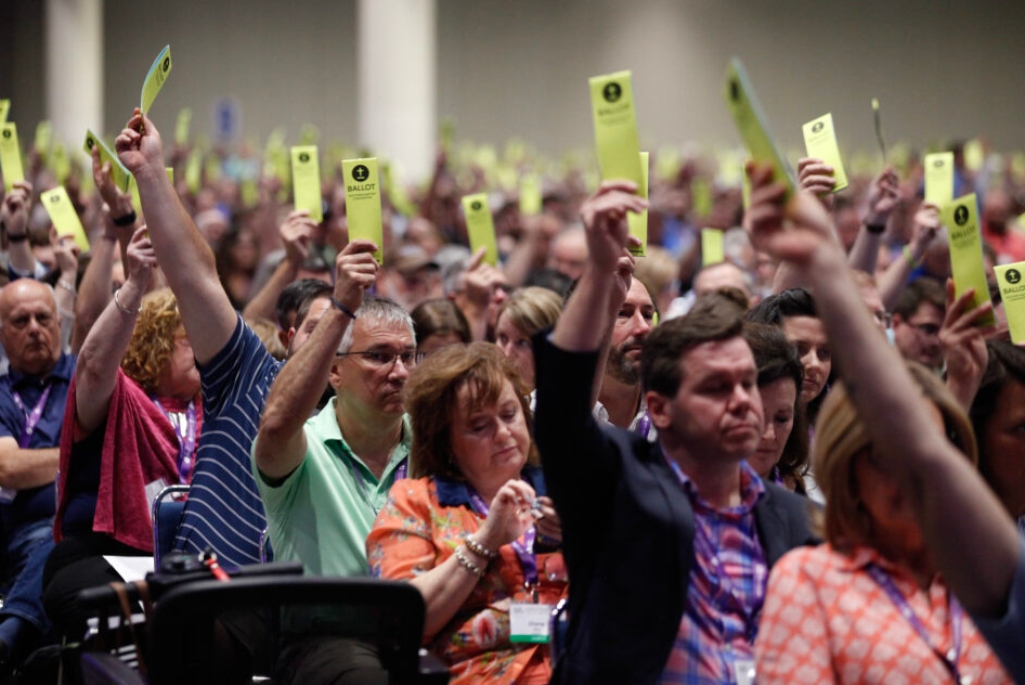
LOUISVILLE, KY (BP) – Danny Hass, a Southern Baptist since age 14, thought it odd when he first saw the woman pastor at Fern Creek Baptist Church about 20 years ago.
“It was odd, a concern, I guess,” he told Baptist Press. “But I’ll be honest. As time went on, very quickly, I didn’t really have an issue with it anymore because she truly walks the way of Jesus. Her life is truly a testament to what He preached, what He taught. So, that concern faded away pretty quickly.”
Hass, now 57 and Fern Creek’s deacon chairman, is speaking of his pastor Linda Popham. She has pastored Fern Creek fulltime since April 4, 1993, after a near three-year term as interim pastor. The 1963 Baptist Faith and Message was the Southern Baptist Convention’s latest doctrinal statement.
The SBC Executive Committee deemed the church not in friendly cooperation with the SBC in February, based on the Baptist Faith and Message 2000’s statement that the office of pastor is scripturally only for men.
The church that averages 150 in attendance is preparing to appeal the EC’s decision at the 2023 SBC Annual Meeting.
“We’re more Southern Baptist than the average Southern Baptist church,” Popham told Baptist Press ahead of the annual meeting.
“We have all the programs,” she said of the church’s Southern Baptist footprint. “We have a strong music program. We still have the full missions program – GAs (Girls in Action), RAs (Royal Ambassadors), Mission Friends, Acteens, Challengers. … That’s why when I tell you we’re more Southern Baptist than the average Southern Baptist church, I’m not joking.”
The church gives 10 percent of its undesignated receipts to Great Commission work, she said, including 2 percent to the SBC’s Cooperative Program, 2 percent to other missions, 2.5 percent to the LRBA, 2.5 percent to Fern Creek Highview United Ministries, and 1 percent to the Baptist Medical and Dental Mission International.
“We are No. 9 in giving in our association,” she said, “out of 155 churches. Obviously, we’re withholding the SBC giving right now.”
Fern Creek interprets the Scriptures used in limiting the pastorate to men – chiefly 1 Timothy 2:9-14, and 3:1-15 – differently than the BF&M 2000
Hass put it this way. “We truly feel that, in those particular Scriptures, the way that we’ve looked at those in history is that Paul was talking about particular women at a particular church. The women felt like they had just gained this freedom, I guess, and they felt like in this particular church if they had questions or needed to speak out, they did, during the service.
“And Paul was very adamant,” Hass said, “about keeping a decorum in church, where things were reverent. There was a particular order to the service. And Paul did not like very much the women speaking out in church and from what I understand, they were not learned like their husbands were. They did not go to the Jewish school.”
Fern Creek was already ordaining women deacons before Hass began attending the church, and before Popham joined the staff as minister of music and youth in 1983. The church bases its decision to hire women and men in ministry on spiritual and biblical standards, Haas said.
“If we feel like they are truly called, by Christ, to fulfill the Great Commission to go and tell, it’s truly something we come together and pray about. And if we feel like they’re truly called, we call them,” Hass said. “Once they have been brought before the deacons and then questioned on their faith, their background and what they believe, as long as they major in the majors and not major in the minors – the major is Jesus Christ.
“Jesus was hard to understand (even) back then, for His own disciples, and sometimes it’s a mystery to us how we interpret things as well. But we feel comfortable as a church having Linda as the pastor or having women deacons.”
Popham also disagrees with the clause limiting the pastorate to men in the BF&M 2000, she told Baptist Press.
“I certainly disagreed with it,” she said of the 2000 statement, “but because I know we are not a creedal people, and we are a confessional people, we would continue to follow the 1963. And the state of Kentucky, at his point, just so long as you follow one of the three (versions of the statement of faith – 1925, 1963 or 2000), it’s acceptable. That’s why in the state of Kentucky it has not been that much of an issue until now.”
Todd Gray, executive director-treasurer of the Kentucky Baptist Convention (KBC), chose not to comment on Popham’s case as discussions continue, but pointed Baptist Press to Article IV, Section 1 of the KBC Constitution and Bylaws.
“Churches in cooperation with the Convention are understood by the Convention to be local congregations of scripturally-baptized believers in general agreement with any of the historic Baptist confessions of faith,” Article IV reads in part.
Todd Robertson, associational mission strategist with the Louisville Regional Baptist Association with which Fern Creek cooperates, said the association is also discussing the issue regarding the EC’s action towards Fern Creek.
“Our leadership is in regular communication with the leadership of Fern Creek Baptist Church and do so built on 63 years of associational relationship with the church and 40 years of relationship with Linda Popham,” Robertson told Baptist Press. “I will simply say that Fern Creek Baptist Church is highly engaged on mission in their community and is very fruitful in their Gospel ministry, they participate through service and attendance with associational activities and partnerships, and they give regularly and generously to the work of the association of churches as we strive together for Kingdom impact in the Louisville Region.”
The association accepts and values several confessions of faith, Robertson said, referencing Article VI of the LRBA Constitution and Bylaws. Included are The Philadelphia Confession of Faith (1742), The New Hampshire Confession of Faith (1833), The Abstract Principles (1859), and “The Baptist Faith and Message Statement of 1925, with revisions in 1963, 1998, and 2000.”
“We encourage each LRBA Baptist congregation to use these confessions of faith as resources to inform and edify Louisville Regional Baptists concerning the basic tenets of our faith,” Article VI reads, “and thus equip us as we seek to fulfill our historic commitment to evangelism, discipleship, missions, education, godly living, and mutual cooperation in bearing a Baptist witness to the world.”
Popham’s appeal will be heard during the June 13 afternoon miscellaneous business session of the annual meeting. She’s appealing, she told Baptist Press, because she enjoys cooperating with sister churches in sharing the Gospel to the ends of the earth, she appreciates the SBC’s evangelistic efforts, and because Fern Creek is a “strong partner” with the Woman’s Missionary Union.
“We want to see Southern Baptists raise up other women to answer God’s call,” Popham said. “We hold fast to the Baptist tenets of the priesthood of the believer and the autonomy of the local church. We think that deeds of darkness need to be exposed.”
Popham, 67, has the support of her husband George, who serves as a Fern Creek deacon, Sunday School director and church host in charge of meals.
The pastor experienced mixed emotions when the EC deemed Fern Creek not in friendly cooperation with the SBC.
“It’s like being kicked out of the family,” she said. “On another level, it makes me very angry because I believe this is happening because of deeds done in darkness. I truly do, and I don’t understand them. There’s a missing link in all this, because why now, when we have served faithfully all of these years, extremely involved in our state and our association, a partner in just about anything the state and association do. And why, why us?
“Why Fern Creek Baptist? There are lots of other churches with female senior pastors, I understand,” Popham said. “I certainly don’t want any of them kicked out, but what is it about us? Why were we chosen for such a time as this?”
(EDITOR’S NOTE – Diana Chandler is Baptist Press’ senior writer.)


